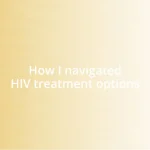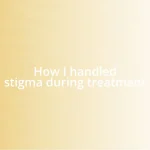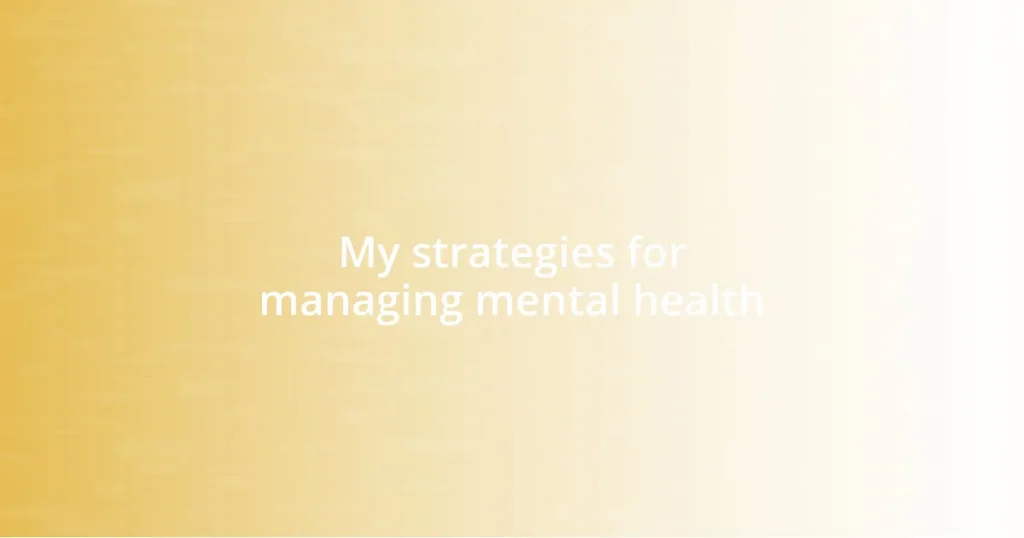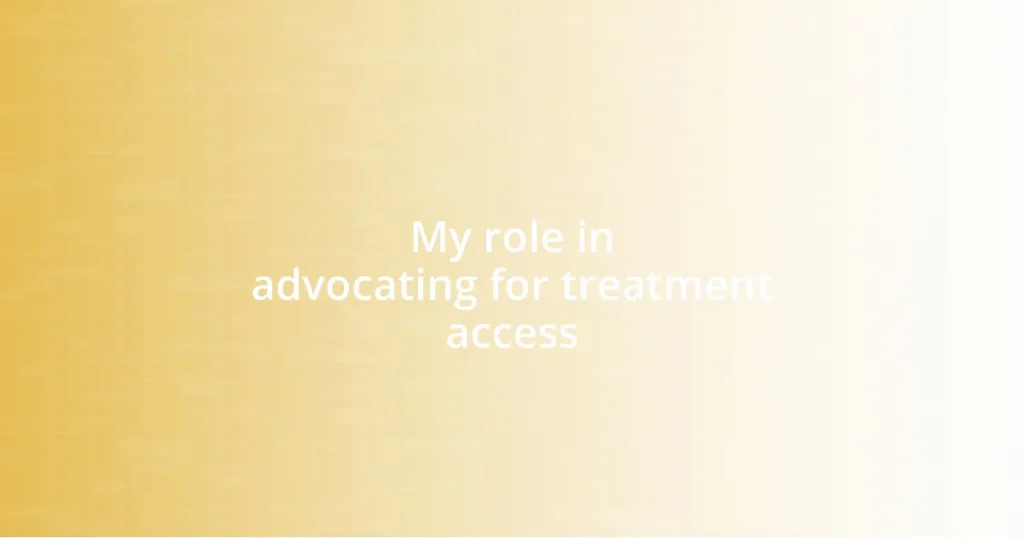Key takeaways:
- Antiretroviral therapy (ART) is essential for managing HIV, helping achieve an undetectable viral load and preventing transmission to partners.
- Adherence to ART is critical; utilizing reminders and support from friends can enhance commitment to treatment.
- Coping with side effects requires resilience and flexibility, including lifestyle adjustments and open communication with healthcare providers.
- Establishing routines, staying informed, and nurturing emotional well-being are key strategies for long-term success with ART.
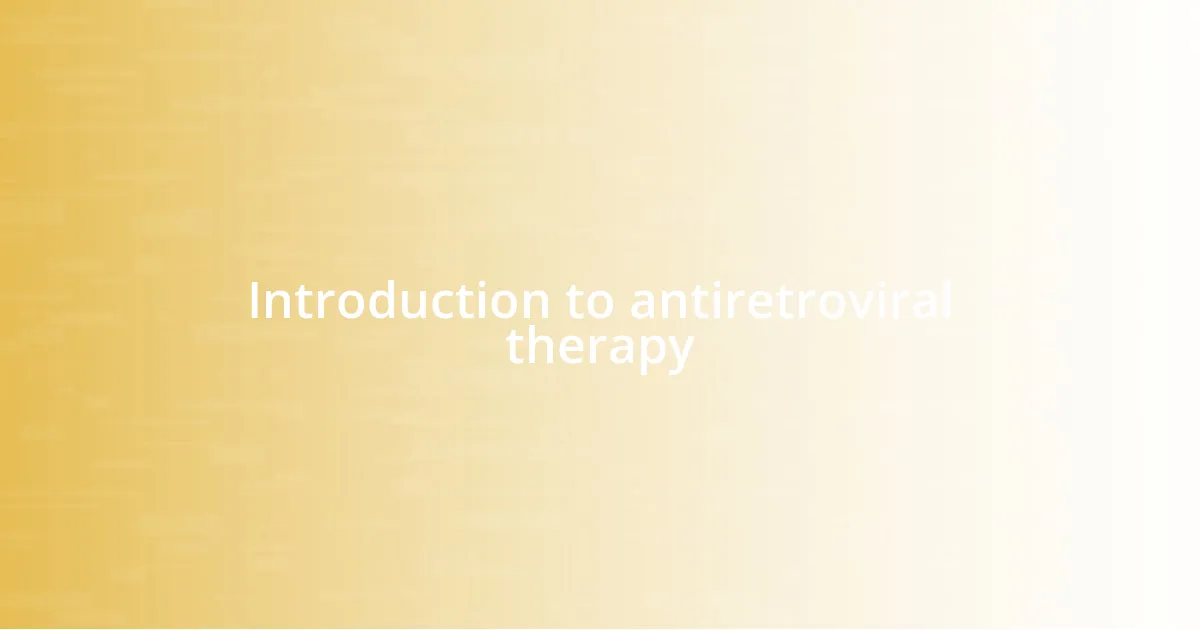
Introduction to antiretroviral therapy
Antiretroviral therapy, commonly known as ART, has transformed the landscape for those living with HIV. When I first learned about it, I was filled with a mix of hope and apprehension. It’s incredible to think that these medications not only help manage the virus but can also lead to an undetectable viral load, which means the virus cannot be transmitted to partners.
For me, starting ART was both daunting and liberating. I remember sitting in that doctor’s office, surrounded by pamphlets and well-meaning advice, questioning how this regimen would impact my life. Would I feel different? How would the side effects affect my daily routine? These questions echoed in my mind as I embarked on a journey toward better health.
As I dove deeper into the world of ART, I began to understand the importance of adherence. Missing doses could lead to complications or resistance. It struck me that, in a way, my relationship with these medications mirrored other commitments in my life—requiring consistency, trust, and a willingness to embrace change. Have you ever felt that about something significant in your life? The emotional pull of knowing I was taking control of my health was profound, underscoring the powerful role that ART plays in ensuring a longer, healthier life for many.
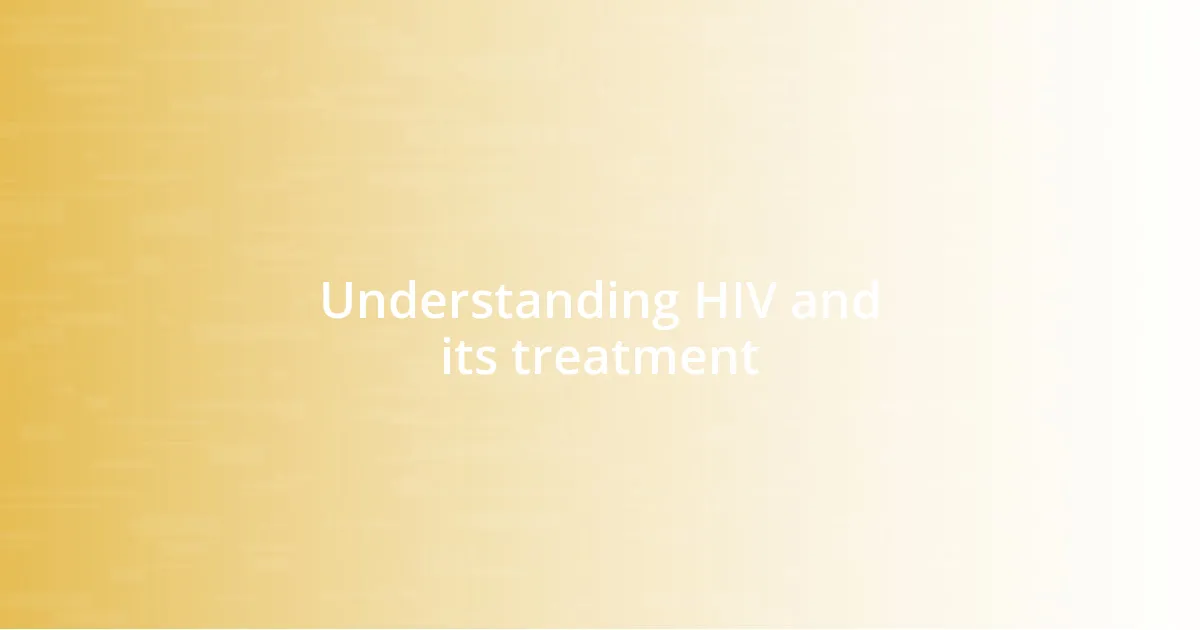
Understanding HIV and its treatment
Understanding HIV requires recognizing the virus’s nature and its impact on the immune system. HIV, or Human Immunodeficiency Virus, attacks the very cells that are meant to defend us, specifically the CD4 T cells. I remember feeling overwhelmed the first time I learned how this virus worked. It felt like my body was under siege, but understanding the enemy helped me feel more empowered in my fight against it.
In terms of treatment, antiretroviral therapy (ART) has become the cornerstone of managing HIV. I used to wonder how these medications could effectively control a virus that seemed so insidious. But as I educated myself, I discovered that ART can reduce the viral load to an undetectable level. This not only improves health outcomes but also eliminates the risk of transmission to sexual partners. It’s almost like reclaiming a part of my life that I thought was lost forever.
Moreover, the journey towards understanding HIV and its treatment also involves mental and emotional resilience. I recall the myriad of emotions I faced when I first started my ART regimen—hope, anxiety, and even a sense of normalcy as I began to comprehend that living with HIV is just part of who I am. I had to remind myself that while HIV is a presence in my life, it does not define my entire existence. This shift in perspective was vital in my journey.
| Aspect | Details |
|---|---|
| Virus Name | Human Immunodeficiency Virus (HIV) |
| Treatment | Antiretroviral Therapy (ART) |
| Function of ART | Reduces viral load to undetectable levels |
| Impact on Transmission | Eliminates risk of transmitting the virus to others |
| Effect on Immune System | Helps maintain health by protecting CD4 T cells |
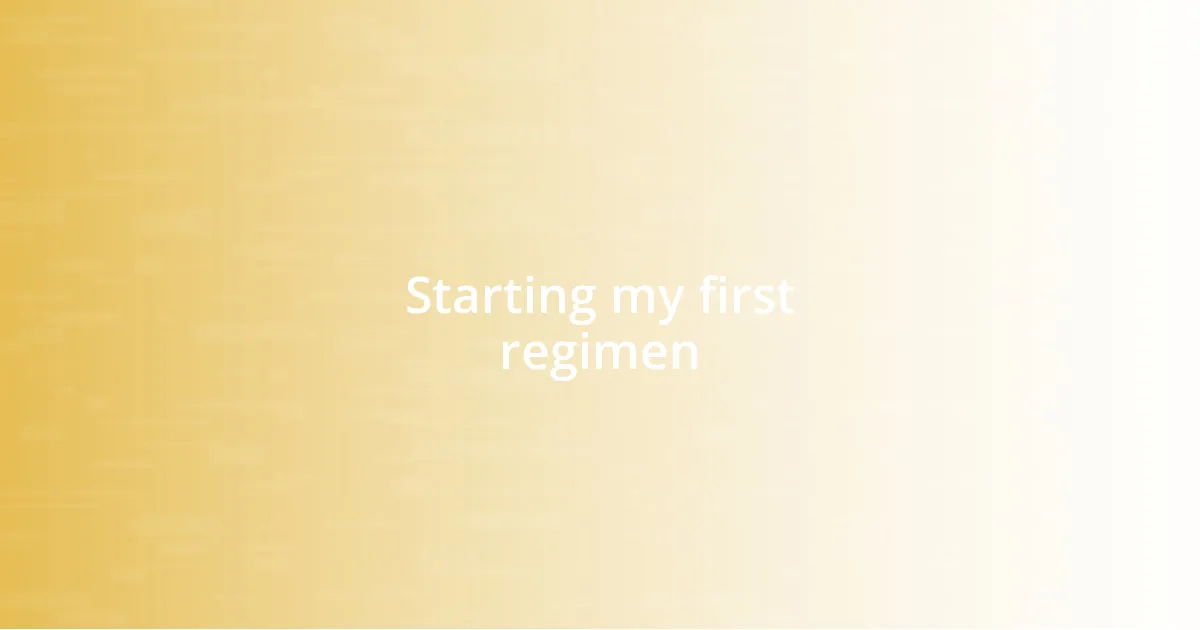
Starting my first regimen
Starting my first regimen was a moment I’ll never forget. As I sat there with my prescription in hand, I felt a strange mix of excitement and fear. It was like standing at the edge of a new chapter, unsure of what lay ahead. I remember taking a deep breath, reminding myself that this was a necessary step towards reclaiming my health.
The first few days were a whirlwind of emotions as I navigated the new routine:
- I set alarms on my phone to remind me of my dosage times.
- I documented how I felt each day, taking notes on any side effects that popped up.
- Gradually, I started to notice shifts in my mindset; I felt more hopeful as the initial fear gave way to determination.
Looking back, I appreciate how vital that period was for shaping my resilience. I felt like not just a patient but an active participant in my own health journey—not just reacting to my HIV diagnosis but taking proactive steps that were truly empowering.
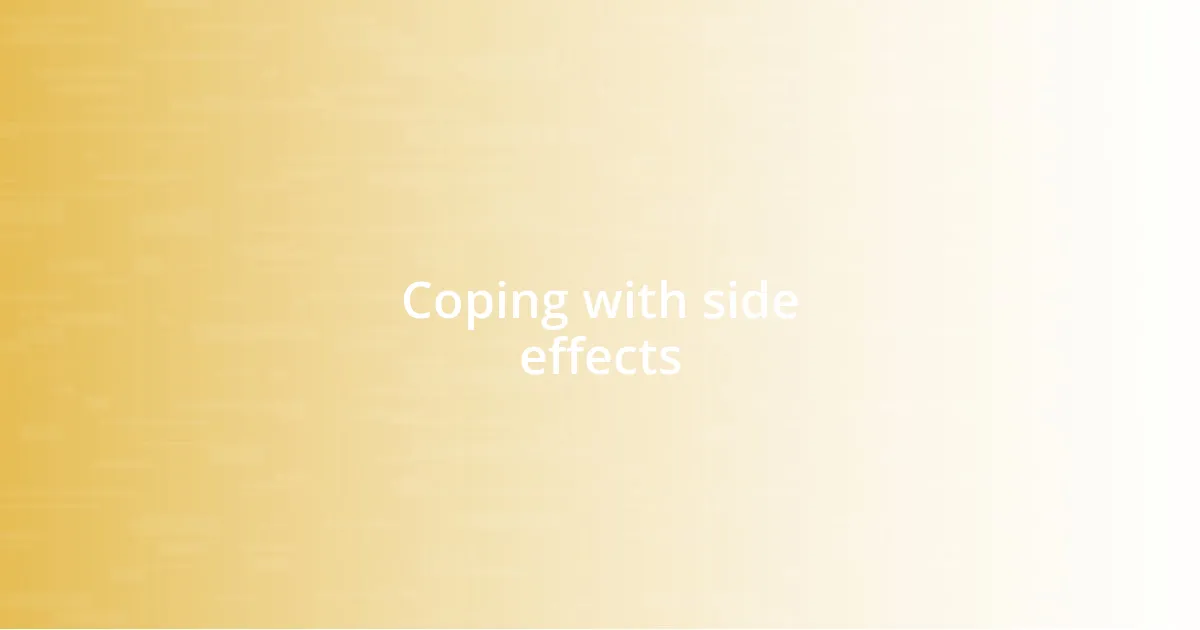
Coping with side effects
Coping with the side effects of antiretroviral therapy can feel like an uphill battle, but it’s essential to find your footing. I recall days when fatigue hit me like a ton of bricks, making even simple tasks seem insurmountable. In those moments, I learned that listening to my body was crucial. Naps became my best friend, a necessary pause to recharge and keep me going.
There were also instances when gastrointestinal issues reared their heads, leaving me anxious about my next meal. What if I could no longer enjoy my favorite foods? Instead of succumbing to worry, I started experimenting with what my body could tolerate. It involved a bit of trial and error, but I found comfort in gentle foods and small, frequent meals. Sharing my experiences with others in support groups also helped; we exchanged tips like a lifeline, fostering a sense of community even in discomfort.
Navigating this journey, I recognized the importance of maintaining a positive mindset. Whenever I faced a particularly tough side effect, I would ask myself, “What can I learn from this?” This reflection often revealed not just resilience but also an opportunity to connect with others facing similar challenges. Each side effect was a reminder of my journey and growth, reshaping my experience into something I could manage, rather than something that managed me.
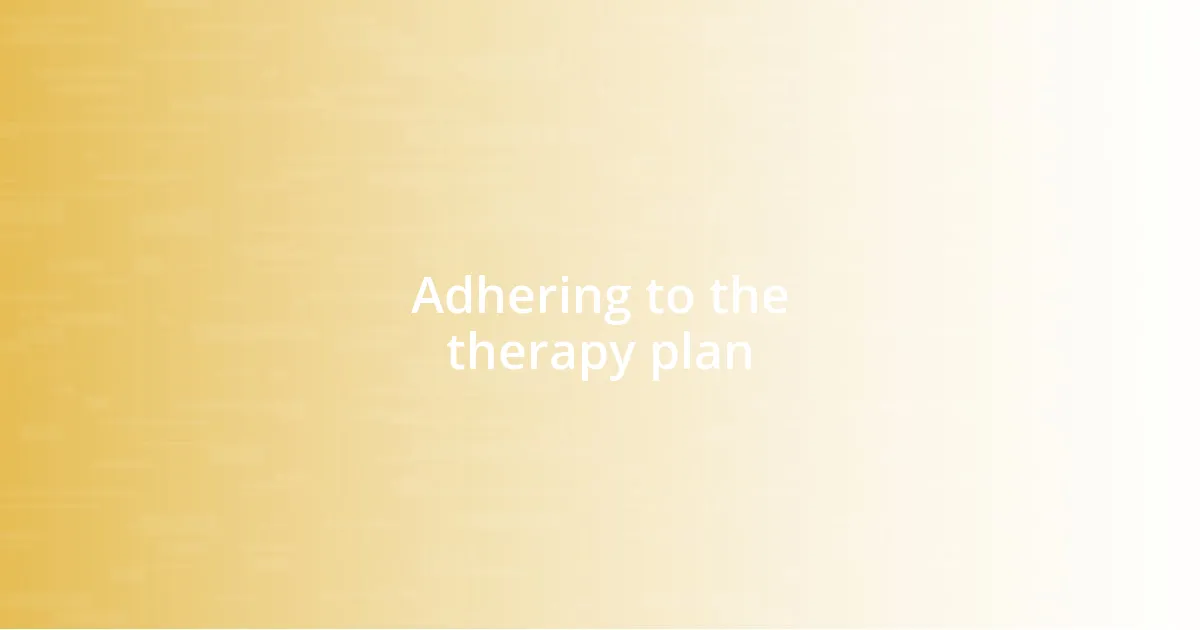
Adhering to the therapy plan
Adhering to the therapy plan is not just about taking pills; it’s about creating a rhythm in my life that supports my health. I remember struggling to keep track of my medication schedule, often wondering, “Am I doing this right?” To combat this, I turned to a simple pill organizer that became a lifesaver for me. Each section felt like a small victory, reassuring me I was on the right path.
Some days, the temptation to skip a dose swirled in my mind, especially during busy weeks. I’d grapple with thoughts like, “Just this once, it won’t matter.” But then, I recalled the countless stories I’d heard in support groups about how crucial that consistency is for the therapy to work effectively. In those moments of doubt, reminding myself of the bigger picture helped reinforce my commitment to the therapy plan.
I also discovered that sharing my journey with friends made a tremendous difference. They helped me stay accountable and even participated in my routine. I often wonder how much the support of loved ones made my experience more manageable. Their encouragement meant I wasn’t just adhering to my therapy plan; I was building a community around it, transforming what could feel like an isolating task into a shared dedication to wellness.
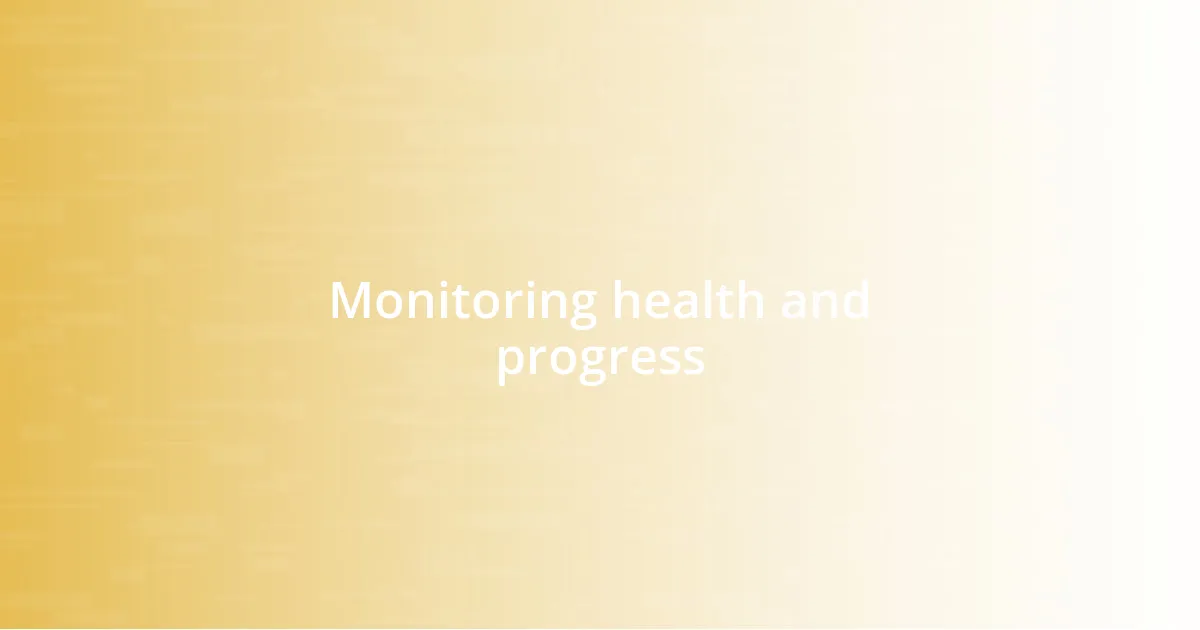
Monitoring health and progress
Monitoring my health and progress during antiretroviral therapy has been an eye-opening experience. Each visit to the clinic felt like a crucial checkpoint, where numbers and results became more than just data; they were reflections of my journey. I remember one particular appointment when my viral load dropped significantly. The wave of relief that washed over me was indescribable. It reaffirmed that all the efforts I put into managing my therapy were indeed paying off.
As I kept a close eye on my CD4 count, it transformed from mere figures into a narrative of my resilience. I often asked myself, “How can I improve this number?” The answer often lay in lifestyle choices like nutrition and exercise. Tracking my daily habits became a game for me. I experimented with different foods and discovered that certain meals not only nourished my body but also boosted my spirit. On particularly tough days, I kept a journal to jot down how I felt both physically and emotionally. Looking back at those entries filled me with a sense of achievement, seeing how far I’ve come while also pinpointing areas that needed attention.
Moreover, I learned the power of open communication with my healthcare provider. Every question I presented felt like a step toward understanding my body better. I would often leave appointments with follow-up questions for myself: “What changes can I make this week to stay on track?” These regular check-ins served as reminders of the importance of self-care. They helped me feel in control of my health rather than a passive participant in my therapy. Each small improvement felt like a victory, proving that monitoring my health was not just about managing my condition but embracing an active role in my journey.
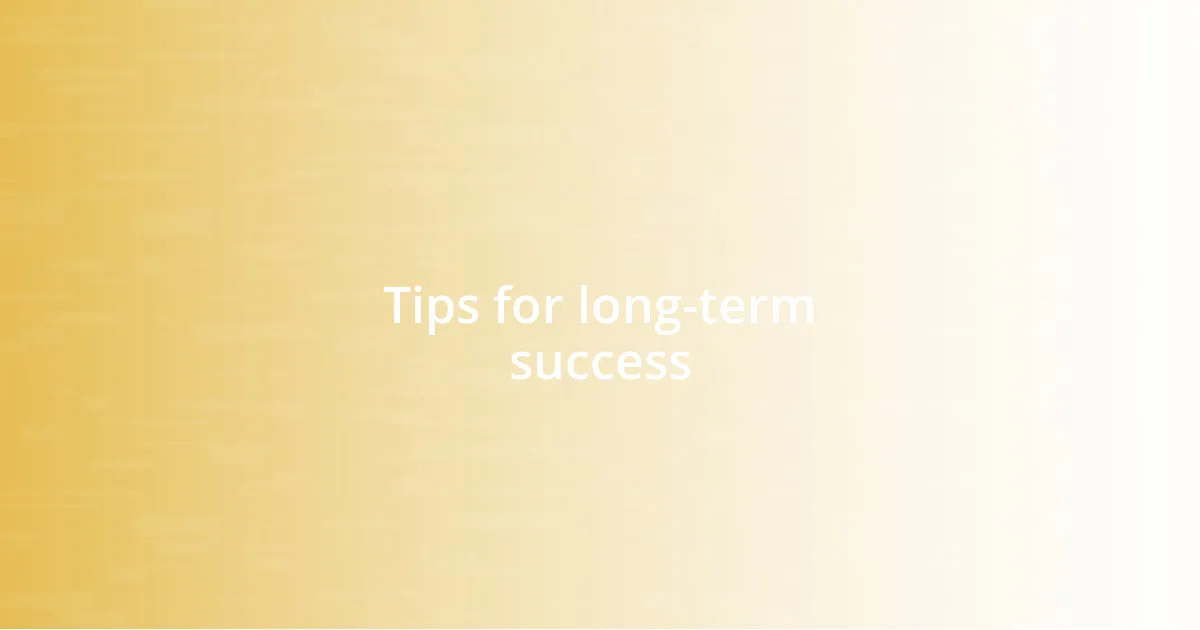
Tips for long-term success
Staying organized is another key ingredient for long-term success with antiretroviral therapy. I found that establishing a daily routine helped me feel more grounded. For instance, I linked taking my medication to a specific time—like with my morning coffee. Suddenly, taking those pills became part of a comforting ritual rather than a chore. Have you ever noticed how small habits can create a sense of normalcy? This tiny pivot made a big difference in my adherence.
Another tip is to remain informed. Engaging with reliable resources about HIV and treatment options became a passion of mine. I often found myself diving into articles or joining online forums. Each piece of new information made me feel more empowered. I’d think, “What can I take from this knowledge to enhance my health journey?” Understanding my condition better transformed my perspective from one of fear to resilience, fueling my motivation to stay committed.
Lastly, nurturing emotional well-being is vital. I learned the hard way that neglecting my feelings didn’t serve me well. There were moments when I felt overwhelmed, questioning everything—my choices, my health, my future. That’s when I decided to incorporate mindfulness practices into my routine. Just a few minutes of meditation or deep breathing could shift my mindset entirely. Have you tried taking a moment for yourself amidst the chaos? Those simple practices restored my peace and fueled my determination to keep pushing forward.






